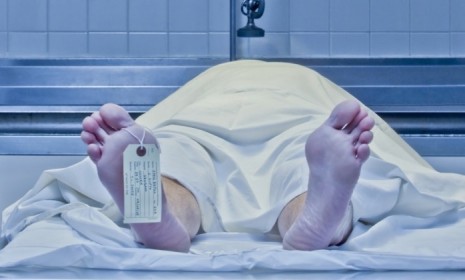Inside America's morgues: 4 disturbing revelations
A high-profile new investigation has lifted the veil on the "Real CSI" — and unearthed some terrifying discoveries

A free daily email with the biggest news stories of the day – and the best features from TheWeek.com
You are now subscribed
Your newsletter sign-up was successful
To watch "CSI," you'd think that our nation's morgues were staffed by highly-trained professionals with the ability and means to study and determine the cause of every suspicious death. But the reality is far different, according to a joint investigation by ProPublica, "Frontline," and NPR. In fact, America's network of medical examiners and coroners is a "deeply dysfunctional system that quite literally buries its mistakes." Here, the reporting team's 4 most disturbing revelations:
1. A catalogue of blunders
Mistakes in America's morgues have put the innocent behind bars, allowed the guilty to go free, and "left some cases so muddled that prosecutors could do nothing," finds the investigation. A physician's error in Mississippi put two innocent men in jail for more than a decade. A doctor in Detroit failed to spot a bullet hole in a corpse's neck, and the bullet lodged in its jaw. In New Orleans, one Dr. Paul McGarry made "errors and oversights in autopsy after autopsy," declaring a woman had died of a drug overdose before inspecting test results, and misidentifying several cases of suspected police brutality.
The Week
Escape your echo chamber. Get the facts behind the news, plus analysis from multiple perspectives.

Sign up for The Week's Free Newsletters
From our morning news briefing to a weekly Good News Newsletter, get the best of The Week delivered directly to your inbox.
From our morning news briefing to a weekly Good News Newsletter, get the best of The Week delivered directly to your inbox.
2. An unqualified workforce
The litany of mistakes may be a result of a lax system and poor training, the reporters suggest. More than 20 percent of doctors working for 60 of the country's busiest morgues failed their forensic pathology examinations. Nearly 1,600 counties across the country employ coroners "who may have no qualifications beyond a high-school degree." The U.S. has only 400 to 500 full-time forensic pathologists to deal with roughly 2.5 million deaths a year.
3. Unidentified murders in Oklahoma?
A crippling lack of doctors and resources has left Oklahama's medical examiners unable to handle their caseloads, reports the team, potentially leaving murders undetected. Its six doctors do not autopsy possible suicides, alleged murder-suicides, or most people aged 40 or over who die of unexplained causes. But a "savvy criminal can make a murder look like a suicide," a Colorado-based pathologist explains. "I think we miss murders," adds Kyle Eastridge, a former Oklahoma homicide detective.
A free daily email with the biggest news stories of the day – and the best features from TheWeek.com
4. Buckets of guts in Massachussets
In the investigation's grisliest revelation, evidence emerged of "disturbingly decrepit conditions" in Massachusetts. At one morgue, the investigation found, doctors were collecting "blood, bile and other bodily fluids in 5-gallon buckets and pumping them back into corpses because a septic system had collapsed, making it impossible to wash the fluids down the drain." The medical examiner's office has also mixed up the identity of bodies, misplaced bones, and lost track of at least five corpses.
Read the entire investigation at ProPublica, listen to it on NPR, or watch the "Frontline" report.